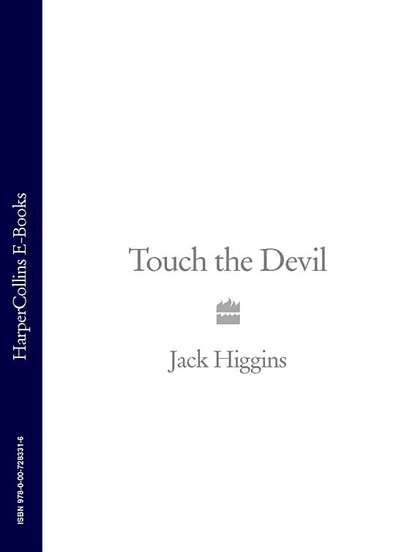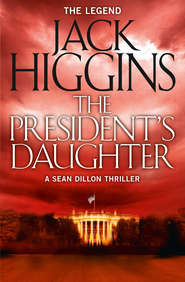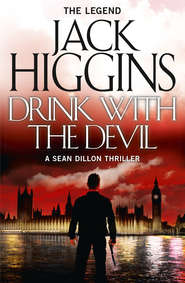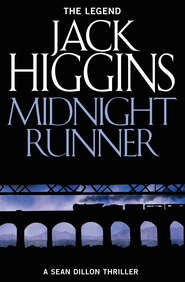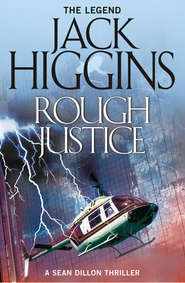По всем вопросам обращайтесь на: info@litportal.ru
(©) 2003-2024.
✖
Touch the Devil
Автор
Год написания книги
2018
Настройки чтения
Размер шрифта
Высота строк
Поля
‘The same locks since eighteen fifty-two or something like that,’ Savary said.
‘So what, it doesn’t get me anywhere, only to the landing,’ Brosnan said. ‘I never told you this before, but I once worked out a way to get out. A little climbing, a certain amount of wading through the central sewage system and I could be outside. Found that out three years ago.’
Savary sat up, his face pale. ‘Then why have you never done anything about it?’
‘Because it gets you nothing. You’re still on the rock and nowhere to go.’
There was the sound of footsteps ascending the steel steps at the far end of the landing and Brosnan quickly closed the door and worked the spoon around again. There was a slight click and he hurried across to the bed and lay down.
The footsteps halted outside, a key turned in the lock, the door opened. The uniformed guard who looked in was an amiable looking man named Lebel with a heavy Walrus moustache. He wore an oilskin.
‘Stir it you two, I need your services.’
‘And what have we done to deserve the honour, Pierre?’ Savary demanded.
‘When I suffer, you suffer; you know I like you,’ Lebel said as they moved past him on to the landing. ‘The bastards have just given me the burial detail for the next month and you know the regulations. When they take their last swim, it must be at night.’
They paused for Lebel to unlock the door in the great steel mesh curtain at the end of the landing and Brosnan peered through it to the central hall below.
‘Who’s dead?’ Savary demanded.
Lebel looked at the paper in his hand. ‘67824 Bouvier. Served thirty-two years. Cancer of the bowel.’
It was a sobering enough thought to kill any further conversation as they descended to the hall and went over to the outer door where the judas gate was unlocked for them by another officer. They crossed the courtyard outside and climbed the steps to the mortuary.
It was a simple enough room with whitewashed walls, and lit by a single naked light. There were several well scrubbed wooden benches in a neat row. The corpse waited on one of them, strapped in a canvas body bag. An old convict in overalls that were too large for him, shoulders bent with age, scrubbed carbolic across the floor. He paused, leaning on his broom.
‘All ready for you, sir.’
Brosnan knew the form, had performed the task many times before. There was a simple wooden cart against one wall which he trundled across and he and Savary got the body on to it.
‘Right,’ Lebel said. ‘Let’s go.’
‘What about the chaplain?’ Savary demanded as they manoeuvred the cart down the steps.
‘Said he didn’t want one. An atheist.’
Savary was shocked. ‘Hell, everybody should be entitled to a priest when he goes.’ He glanced sideways at Brosnan. ‘You make sure they do things right for me.’
‘You won’t die, you old bastard,’ Brosnan said. ‘You’ll live for ever.’
The guard on duty at the gatehouse emerged to open the gates and they moved outside and followed the road, not down toward the harbour, but curving up to the left. It was hard work, pushing uphill. Finally, they came out on to a small plateau on the edge of the cliffs.
There was no moon and the rock dropped sheer, a good forty feet into the water. There was an impression of waves out there, broken water, white foam, and Brosnan could feel salt on his lips like the taste of freedom.
Behind them, Lebel switched on a light above a wooden door and unlocked it. ‘All right, let’s get the weights on him.’
The room was small with a wooden bench in the centre on which Brosnan and Savary placed the body. One of the walls was hung with a selection of oilskins and orange life jackets. The most interesting feature was the piles of heavy steel chain coiled neatly on the floor, each one in a different weight category according to a painted board on the wall behind it.
‘Right.’ Lebel consulted his document. ‘He weighed seven and a half stone at death. Christ, we can’t have that. He’ll float like a cork on that current.’ He turned to a sheet on the wall. ‘Ninety pounds of chain according to this. Get it on him.’
Brosnan took a chain from the correct pile and they proceeded to pass it through the loops specially provided for the purpose on the body bag.
‘I’ve often wondered why you make all this fuss over the weights, Pierre.’ Savary remarked. ‘The way you change it, according to the body weight?’
Lebel produced a pack of Gauloises and offered them one. ‘Simple. The Mill Race isn’t one current as most people imagine. It’s two. Stay on the surface, you’d end on the rocks at St Denise ten miles up the coast and bodies drifting in as regularly as that would scare old ladies walking the dog. But drop the body down to thirty fathoms, the current takes it out to sea. So, the weight factor is critical. Anyway, let’s get this over with.’
Brosnan and Savary carried the body between them to the edge of the cliff. They stood there for a moment and Savary said, ‘I tell you he should have a priest. This isn’t right.’
Lebel, his essential decency coming to the surface, removed his cap and said, ‘All right. Lord, into thy hands we commend the spirit of 67824 Jean Bouvier. He didn’t get much out of this life. Maybe you can do more for him in the next.’ He replaced his cap. ‘Okay, over with him.’
Brosnan and Savary swung a couple of times, then let go. The body turned over once, plunged into white foam below and disappeared. They stood staring down at the water.
Savary whispered, ‘The only way I’m ever going to get off this rock. I’m going to die here, Martin.’
There was desolation in his voice, total despair, and Brosnan put a hand on his shoulder. ‘Maybe – on the other hand, maybe not.’
Savary turned to stare at him, frowning, and Lebel closed and locked the door and switched off the light. ‘Okay, let’s go,’ and they turned and followed him back down the track, heads bowed against the rain.
At six a.m. Ferguson and Harry Fox were having breakfast in a truck drivers’ cafe on the A40 just outside Cheltenham. The bacon and eggs were the best Fox could remember enjoying since the Officers’ Mess at Combermere Barracks in Windsor. Ferguson was obviously just as impressed.
‘What about Devlin, sir?’
‘Remarkable man. Must be sixty-one now. An Ulsterman. County Down, I believe. Father executed during the Anglo-Irish war in nineteen twenty-one for serving in a flying column. Educated by Jesuits, took first class honours in English Literature at Trinity College. Scholar, writer, poet and highly dangerous gunman for the IRA during the thirties. Went to Spain in nineteen thirty-six. Served in the Washington Brigade against Franco. Captured by Italian troops and imprisoned in Spain until nineteen forty when the Abwehr had him freed and brought to Berlin to see if he could be of any use to German Intelligence.’
‘And was he, sir?’
‘The trouble was, from their point of view, he was a bad risk. Very anti-fascist, you see. The Abwehr’s Irish Section did use him once. They’d sent an agent to Ireland, a Captain Goertz. When he got stuck, they parachuted Devlin in to get him out for them. Unfortunately Goertz was caught and Devlin spent several months on the run before he managed to make it back to Berlin via Portugal. From then on, Ireland was a dead end as far as the Abwehr was concerned and Devlin took a job lecturing at the University of Berlin. Until the autumn of nineteen forty-three.’ Ferguson reached for the marmalade. ‘This really is very good. I think I’ll ask him for a jar.’
‘The autumn of nineteen forty-three,’ Fox said patiently.
‘How much do you know about the German attempt on Churchill’s life in November of that year, Harry?’
Fox laughed out loud. ‘Come on, sir, an old wives’ tale, that one.’ And then, continuing to watch Ferguson’s face, he stopped laughing. ‘Isn’t it, sir?’
‘Well, let’s assume it’s just a good story, Harry. The scenario would run something like this. Devlin, bored to tears at University of Berlin, is offered a job by the Abwehr. He’s to parachute into Ireland, then make his way to Norfolk to act as middle man between the most successful woman agent the Abwehr had in the entire war and a crack force of German paratroopers, led by a Colonel Kurt Steiner, the object of the exercise being to apprehend Churchill who was staying at a country house outside the village of Studley Constable.’
‘Go on, sir.’
‘All for nothing, of course. Wasn’t even Churchill, just a stand-in while the great man was going to Tehran. They died anyway, Steiner and his men. Well, all except one, and Devlin, with his usual Irish deviousness, got away.’
Harry Fox said in amazement, ‘You mean it’s all true, sir?’
‘A few years yet before those classified files are opened, Harry. You’ll have to wait and see.’
‘And Devlin worked for the Nazis? I don’t get it. I thought you said he was anti-fascist?’
‘Rather more complicated than that. I think if someone had suggested on our side that he should attempt to kidnap Adolf Hitler, he’d have thrown himself into the task with even greater enthusiasm. Very frequently in life we’re not playing the game, Harry. It’s playing us. You’ll learn that as you get older.’





